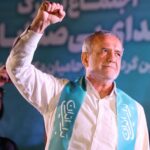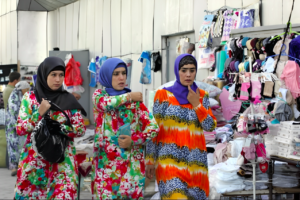Amid the growing suppression of the few remaining vocal critics of the government, a fierce campaign has been launched against “no war” activists in Azerbaijan.
The breakout of the Second Karabakh War in 2020, saw the emergence of a “no war” discourse and activism in Azerbaijan as an anti-hegemonic response to the militarism pervading the society.
United around anti-militarist and pro-peace ideas, different collectives and independent individuals, rather than an organized initiative or group, the “no war” voices criticized the war and subsequent nationalist revival. Back then, the “no war” activities mainly consisted of social media posts and virtual discussions.
Unlike in Russia, and surprisingly for many Western observers, the Azerbaijani government never directly persecuted anti-war voices. Until now, they have largely been ignored by the official and state-controlled media and subjected only to online harassment from nationalists.
But now a fierce campaign against “traitors” in mainstream media has created a sense of foreboding among activist circles. Considering the regime’s high level of public legitimacy, the recent arrest of prominent economist and opposition politician Gubad Ibadoglu, and the arrests of striking gig economy workers, these fears may further paralyze the most controversial field of progressive activism in Azerbaijan.
The campaign seems to have been triggered by a statement issued by the Feminist Peace Collective that called on the Azerbaijani government to end its now-9-month-old blockade of the Armenian-populated Nagorno-Karabakh region. The statement accused the government of “instrumentalizing identity politics” to divide Azerbaijanis and Armenians and placed the Karabakh blockade in the same context as domestic repressions such as the lockdown of the village of Soyudlu after environmental protests there in June.
The backlash was swift.
“‘Feminist Peace Collective’: A new ‘opposition group’ protecting Armenians is being established in Azerbaijan,” read one headline. The article asserted that the peace movement was part of a broader nefarious campaign by the EU and Canada to propagate LGBT and “anti-national” ideas among Azerbaijanis.
Homophobic tropes were seen in other propaganda materials as well, including a report on stridently pro-government Real TV in which the presenter sarcastically remarked that “gays can do whatever they want” as long as they “remain patriotic.”
Soon the “anti-anti-war” campaign was in full swing. After the Liberal Society organized a discussion in Baku on the state of “no war” activism since 2020, media and even officials called for the “traitors” to be punished.
The event was open to the public, and pro-government media outlets were in attendance. They later showed clips of speeches at the event in order to shock their audience and anathematize the “fifth column” activists.
Headlines like “Local ‘No War’ supporters: The mask of betrayal has fallen” and “Azerbaijani no war-ists’ liberalism means supporting terrorists: video of betrayal” were used in the media campaign to discredit the activists.
The campaign was then taken up by members of parliament. MP Elman Mammadov called on law enforcement agencies to enact “urgent and serious measures because this is an action against our statehood and security.” Another MP, Aydin Mirzazadeh, said that “no war” activists “have no connection with the people of Azerbaijan” and are instead “puppets of the interests of foreign circles in Azerbaijan with foreign financial resources.”
Lastly, the Karabakh Veterans Public Union called on the authorities to “immediately investigate and interrogate such people living in Azerbaijan” and make them “apologize.”
The campaign creates a nationalist environment where peace activists, the new “internal enemy,” are not meant to feel psychological and physical safety.
Never-ending repressions
It’s noteworthy that the campaign has been at pains to connect the “no war” activists to the traditional enemies of the regime.
These include Gubad Ibadoglu and his daughter, Jale. In late July, authorities arrested and allegedly tortured the UK-based economist and politician, who is popular among educated young people, during a visit to Azerbaijan. He is accused of having ties with US-based Turkish cleric Fethullah Gulen, whom the Azerbaijani government considers a terrorist. But many believe Gubadoglu’s arrest was connected to his pledge to secure the confiscation of money that corrupt Azerbaijani officials had stolen from the state and stashed in foreign bank accounts.
There have also been allegations of links between “no war” activists and the trade unionists who organized food delivery worker strikes. In early August, three active Worker’s Desk Trade Union Confederation members were arrested on bogus charges. The repressions against the trade union activists are new for Azerbaijan and demonstrate the government’s allergic reaction to any form of protesting organization.
In the three years that have elapsed since Azerbaijan’s victory in the 2020 war, support for the government has remained extremely high. Yet in this time the authorities have not only not let up on their repressive measures, they have intensified them to such a degree that any criticism of the government will soon be impossible.
In such an oppressive environment, the “no war” community feels frightened and threatened, and many are now choosing to keep quiet and avoid media attention. For many progressive activists – and indeed for the entire political spectrum of Azerbaijan – the future is uncertain and not promising.
Source : EURASIA











